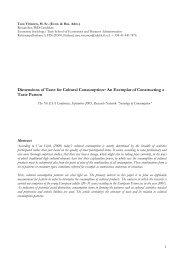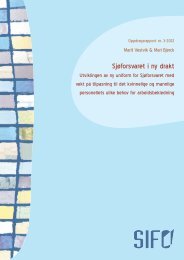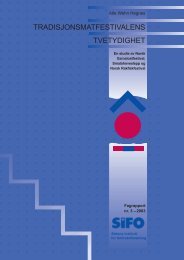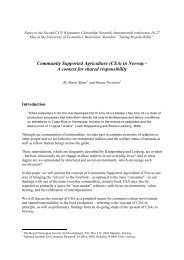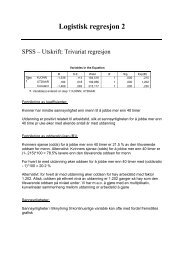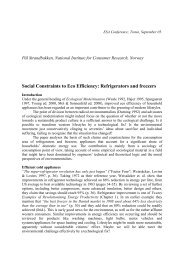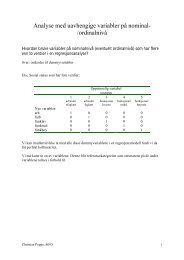an investigation of domestic laundry in europe - habits ... - SIFO
an investigation of domestic laundry in europe - habits ... - SIFO
an investigation of domestic laundry in europe - habits ... - SIFO
Create successful ePaper yourself
Turn your PDF publications into a flip-book with our unique Google optimized e-Paper software.
Assessment <strong>of</strong> the consumer <strong>laundry</strong> <strong>habits</strong> - a qu<strong>an</strong>titative survey 23Ten statements regard<strong>in</strong>g <strong>laundry</strong> <strong>habits</strong> were listed <strong>in</strong> the questionnaire, <strong>an</strong>dthe respondents were asked to what extent they agreed or disagreed withthese. We adopted a scale r<strong>an</strong>g<strong>in</strong>g from 1 to 5, where 1 signified “fully disagree”<strong>an</strong>d 5 signified “fully agree”. The statements dealt with several topics:1) Attitudes on how textiles are presented <strong>in</strong> a social context2) Attitudes on the cle<strong>an</strong>ness <strong>of</strong> textiles3) Attitudes towards the <strong>laundry</strong> process <strong>an</strong>d its impact.These statements also address other aspects <strong>an</strong>d could <strong>of</strong> course be <strong>in</strong>terpreted<strong>in</strong> other ways, but for the present purpose we shall stick to these three themes.2.3.1 Attitudes regard<strong>in</strong>g textiles <strong>in</strong> a social contextMost clothes are public <strong>in</strong> the sense that when you are wear<strong>in</strong>g them, <strong>an</strong>yonec<strong>an</strong> see <strong>an</strong>d smell them. We had three statements related to the public aspects<strong>of</strong> cloth<strong>in</strong>g:- Clothes should always smell as if newly washed- It is embarrass<strong>in</strong>g to wear clothes with a body odour- Boil<strong>in</strong>g is unnecessary as modern detergents keep clothes white <strong>an</strong>yway.Figure 2-1 shows that smell is not accepted <strong>in</strong> <strong>an</strong>y <strong>of</strong> the countries 1 . Especiallythe Sp<strong>an</strong>ish respondents hold that clothes should not have a body odour,followed by the respondents from the Netherl<strong>an</strong>ds <strong>an</strong>d Spa<strong>in</strong>. The Norwegi<strong>an</strong>respondents seem to be less concerned about smell.The statement that clothes should smell as if newly washed is most stronglyagreed with by the Greek respondents, followed by the Sp<strong>an</strong>ish respondents,while the respondents from the Netherl<strong>an</strong>ds <strong>an</strong>d Norway seem to place lessemphasis on this aspect.The third statement refers to the appear<strong>an</strong>ce <strong>of</strong> textiles or garments: “Youdon’t have to boil modern textiles to keep them white”. In all <strong>of</strong> the countriesthe respondents agreed less with this statement. The Sp<strong>an</strong>ish respondentsseem to have the most confidence <strong>in</strong> modern detergents <strong>an</strong>d low temperatures,while the Greeks <strong>an</strong>d Norwegi<strong>an</strong>s are the most sceptical.1 In the follow<strong>in</strong>g figures the different countries will be presented <strong>in</strong> alphabetical order, i.e.,Greece, the Netherl<strong>an</strong>ds, Norway <strong>an</strong>d Spa<strong>in</strong>.





